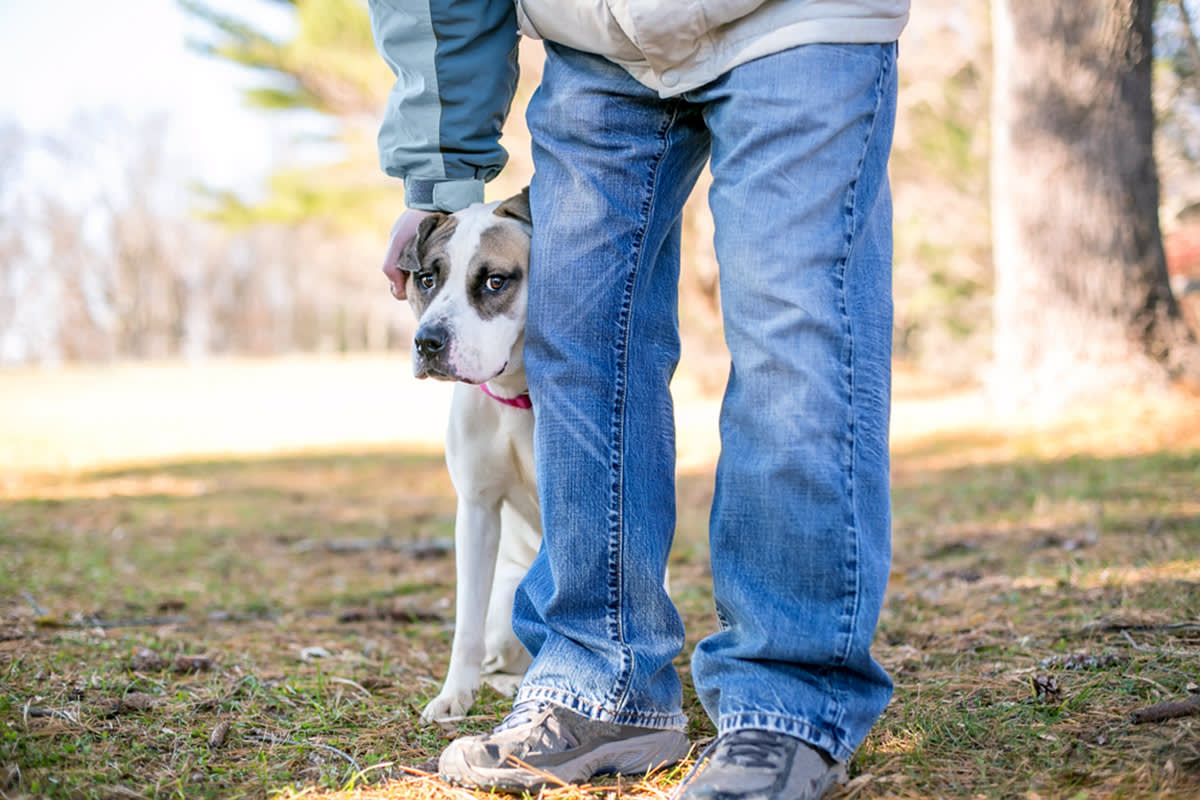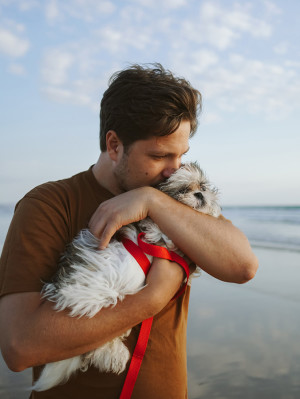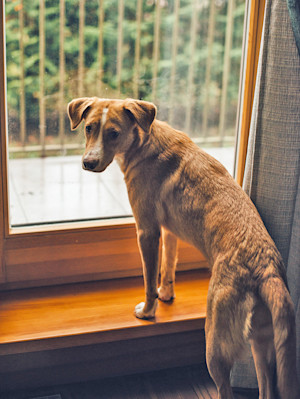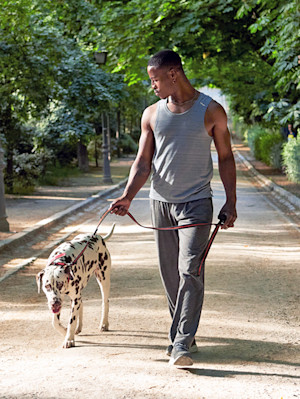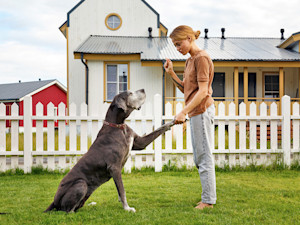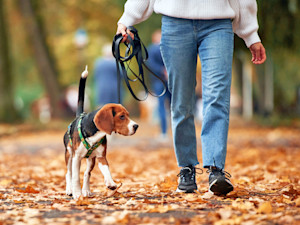6 Myths About Aggressive Dogs That Are Totally Not True—And Super Harmful
First of all, it’s not your fault.
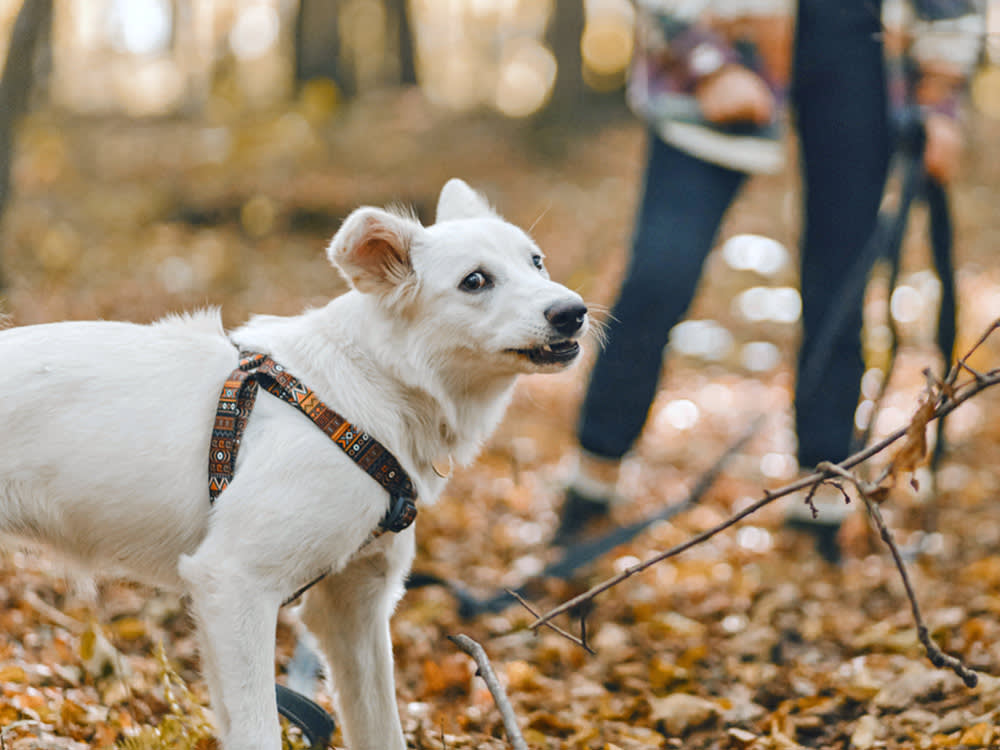
Share Article
As a canine behaviorist and dog trainer specializing in the evaluation and treatment of dogs with serious behavioral issues, I work with a lot of aggressive dogs. No matter what their rap sheet contains, I’m drawn to them and find them lovable. Every aggressive dog has a story, and my job is to move heaven and earth to reach a happy ending for each one of them.
I love what I do, and one central belief informs much of my work: Aggressive dogs are misunderstood. Being able to understand them and their challenges allows me to help people and dogs have the life and the relationship they want.
In a first session with a family, I’ll often spend much of the time dispelling myths about aggression in dogs. These harmful myths cause people to feel guilt and shame and to blame themselves unnecessarily, and they prevent dogs from getting the help they need. I’m not having it!
Here are six of the most common and damaging myths about aggressive dogs — busted.

It’s the pet parents’ fault.
Variations include: “There are no bad dogs, only bad people” and “It’s all in how you raise them.” There are so many reasons that dogs behave aggressively, and blaming people is not the answer. Fear is at the root of most canine aggression, and a lot of it is genetic. Some dogs are just naturally fearful. Others have experienced something traumatic that results in the fearfulness responsible for their undesirable aggressive behavior. Additionally, an inability to handle frustration, being in pain, or a medical condition can lead to aggression.
Even in cases where dogs may not get enough training or socialization, the pet parents are not at fault. It’s only fair to point out that many people who have failed to give their dogs these things don’t end up with dogs who behave aggressively. There is generally something intrinsic in a dog who behaves aggressively. Plenty of pet parents raise generations of dogs who don’t have these behavioral issues before they get a dog who does. If the people were causing the aggression, you would expect all of their previous dogs to struggle with the same problem, but that’s just not happening.
There’s nothing you can do.
On a weekly basis, people tell me that I am their last hope because they have tried everything. Not once has that ever been true. There are many ways to help aggressive dogs:
desensitization and counterconditioning
chiropractic care
getting rid of the fan making a high-pitched whirring sound the dog hates
using better treats
avoiding triggers on walks
moving their bed out of a heavily trafficked area in the house
blocking the glass in the door so the dog can’t see and bark at every passerby
incorporating nose workopens in new tab into their lives
checking their hearing or eyesight
changing their exercise routine
focusing on a wide variety of enrichment activitiesopens in new tab
using a different leash and collar
There are so many ways to work on this behavior, and it’s unreasonable to think anyone has ever exhausted them all. Giving up when there is so much reason for hope is tragic.
They are trying to dominate you.
No other myth about aggressive dogs has done more damage than the idea that all aggressive dogs act that way because they want to be alpha and dominate you. It’s a tired, old, outdated idea that is thankfully losing ground today. That’s good news because it is not a useful paradigm to understand or to improve canine behavior. The original ideas about dominance came from studying captive wolves.
Not only are there problems with applying what is learned about wolves to domestic dogs, the original researchers have long ago acknowledged other problems with the study, including that it was done on unrelated individuals in captivity rather than family groups in the wild.
Every dog can be totally “cured.”
In my experience, every dog can get better, but it’s not easy to predict how much better each individual dog’s behavior will be. I’ve seen it all: There are dogs who are barking and lunging at everyone and everything at the start but turn into cuddly lovebugs with effort and perseverance.
There are dogs who can hardly go on a walk because they react to all the dogs they see but learn to have play dates and play buddies. I’ve also seen dogs who improve with visitors. They may now accept certain friends who come over but still don’t like most people. I’ve also seen dogs who never learn to be OK around children and simply must not be allowed to get close to them, even if they have learned to observe them from a distance without going bananas.
They must have been abused.
Sadly, dog abuse is far too common. But it’s also true that a lot of dogs who act like they have been abused have not been treated unkindly; they are just naturally fearful. Dogs may cower and be unable to cope with men or children or be triggered by people carrying large objects that scare them. This is often caused by inadequate socialization, a genetic tendency to be fearful, or both. Many aggressive dogs are fearful, but only a few of these pups may have been abused.
Any abuse of dogs is too much abuse, yet it gives me some comfort knowing that abuse is not as rampant as sometimes suspected. Just because a dog is aggressive out of fearfulness does not mean something more nefarious is behind it.
They just need more love.
If only! If more love was all it took, everyone with an aggressive dog would be able to improve their dog’s behavior in a snap. Is love important for helping this behavior? Absolutely! Is love sufficient for helping aggressive dogs? Sadly, no. The effort people go to help their aggressive dogs — adjusting their lives, skipping vacations, never having people over, walking their dog at 2 a.m., and spending money (so much money!) on behavior, training, and medical care is astounding.
People with aggressive dogs love their pups so much, but that alone doesn’t stop the aggressive behavior. One of the saddest parts of having an aggressive dog is that very few people ever see your dog the way you do. They only see the dog at their worst instead of getting to share in all their other amazing aspects.
Bottom line: Don’t listen to the lies.
There are so many misrepresentations about aggressive dogs that do so much harm to people and their dogs. These myths make people feel ashamed, prevent dogs from getting the help they need, lead to more injuries, and can even cost dogs their lives.
It’s important to bust these damaging and hurtful myths with the actual truth about aggressive dogs so as many as possible of these lovable canines and their deserving people can have their happy endings.

Karen B. London, PhD, CAAB, CPDT-KA
Karen B. London is a certified applied animal behaviorist (CAAB) and certified professional dog trainer (CPDT) who specializes in working with dogs with serious behavioral issues, including aggression. She has written for a variety of magazines including The Bark, Clean Run, and the APDT Chronicle of the Dog, and has published in scientific journals including Behavioral Ecology and Sociobiology, Ethology, Ecology, and Evolution, the Journal of Insect Behavior, and Insectes Sociaux. She is the author of seven books about dog training and canine behavior, including the forthcoming My Dog's Mystery Adventure: And Other Stories From a Canine Behaviorist and Dog Trainer.
Related articles
![Young man cuddling little white shih tzu puppy by the Atlantic Ocean.]()
9 Myths About Your Puppy—Busted By a Behaviorist
The internet has a lot to tell you about your new addition. Here’s what’s actually true.
![Sad dog waiting by window at home.]()
6 Lies You've Been Told About Your Dog’s Separation Anxiety
Remember, it’s not your fault, no matter what anyone says.
![Man walking his Dalmatian dog outside.]()
7 Dog-Walking Myths You Should Never Believe
Not everything you're told about taking care of dogs is true.
![Woman training her Great Dane dog outside.]()
7 Dog-Training Myths—Busted by a Behaviorist
Training them to roll over is useless—and other falsehoods.
![Cute Beagle dog being walking outside in the park.]()
6 Hacks to Prevent Your Dog’s Problematic Behavior Before It Even Starts
Keep your dog from pulling on their leash, counter surfing, stealing socks, and more.
![Cute Shiba Inu dog staring at owner to get their attention.]()
7 Ways to Get Your Dog to Stop Doing Something Naughty without Saying “No”
It’s a reflex to yell “no,” but it’s not the best option.
